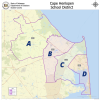Connecting vulnerable Delawareans to food, education, opportunity
One in ten of our neighbors across Delaware is food insecure: they lack consistent access to the nutrition they need to live healthy and active lives. At the same time, one in four Delawareans lacks the home internet connectivity they need for educational opportunity and economic mobility.
These challenges are interlinked: broadband helps improve food production and distribution, while digital access helps families in need connect with programs to end hunger. More importantly, digital access is now a must-have for families struggling to break the cycle of poverty and climb the economic ladder toward stability, opportunity and security.
Over the past two years, smart public investments have fueled unprecedented progress toward closing both gaps. The American Rescue Plan Act included more than $12 billion to combat hunger, including offering free school lunches to 10 million additional students nationwide. Meanwhile, the infrastructure bill’s Affordable Connectivity Program makes more than 200,000 Delawareans eligible to get home internet service for free.
But as funding for these pandemic-era initiatives winds down, officials in Washington have a choice to make: will we continue to invest in these ladders of opportunity or throw in the towel and hand back all the hard-won progress of the past two years?
This summer, Congress took an encouraging step by passing the Keep Our Kids Fed Act. Millions of school children were just days away from losing access to free school lunches, until lawmakers in both parties reached a common-sense compromise to ensure funding and flexibility for schools serving our most vulnerable kids.
The next Congress will face a similar choice on whether to extend funding for the ACP’s broadband assistance payments. More than 14 million households are already enrolled and benefitting – a number that could triple if every eligible household signed up. But the program’s funding will run out by 2024 if lawmakers don’t act to refill its coffers.
That would be a big mistake.
Home internet connectivity is a great equalizer, putting a vast universe of learning opportunities and job training resources at the fingertips of anyone with a broadband subscription and a connected device. Low-income households and families of color have long been less likely to have home internet, but the ACP is narrowing this digital divide by removing cost as a barrier to getting online.
Instead of pulling the rug out from under the millions who’ve gained internet service through this program, we should instead double down on getting more families signed up and connected. Delaware can commit more of our federal broadband funding to support front-line community organizers to offer digital literacy training and ongoing mentorship. And if federal lawmakers in Washington are slow to extend funding for the ACP, state lawmakers in Dover can make up the gap and ensure Delaware remains a national leader in expanding digital opportunity.
It's in everyone’s self-interest to help Delaware build a healthy, strong and more digitally literate workforce. Here at the Food Bank of Delaware, we’ve seen firsthand how investing in workforce skills programs empowers economic mobility – and since 90% of all jobs created by 2030 will demand digital know-how, states that lean in now to build these skills will reap the economic rewards for years to come.
The COVID-19 pandemic reinforced the importance of strong safety nets. From eviction moratoriums and expanded child tax credits to universal school lunches and broadband subsidies, the patchwork of bold (and largely bipartisan) responses drove record decreases in poverty nationwide.
As a new Congress takes office this month, our leaders in Washington have an historic opportunity to secure these gains and guard against sliding backwards. Let’s hope both parties can work together to get the job done.


















































